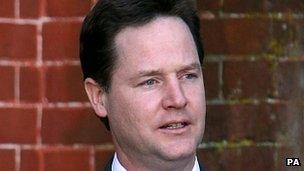Nick Clegg promises to 'see Lords plan through'
- Published

Nick Clegg said the changes would make Parliament more accountable to voters
Nick Clegg has promised the government will "see through" its plans for an elected House of Lords, despite opposition from some peers.
The deputy prime minister told a committee of MPs and peers it was a "clear ambition" and change would create greater democratic legitimacy.
Ministers want the Lords to be between 80% and 100% elected.
But opponents argue this will undermine the supremacy of the Commons and reduce levels of expertise within Parliament.
The Conservatives, Liberal Democrats and Labour support change but many peers, most of whom are appointed, and some MPs argue the government's approach is flawed.
The deputy prime minister gave evidence to the Joint Committee on the Draft House of Lords Reform Bill, set up last year to study the government's proposals and recommend changes.
'Irresponsibility'
He said: "I would suggest that the evidence shows that we have confounded our critics, that if we set our minds to try and do something ... we see things through and this is a clear ambition for this government."
Asked whether the government would impose a three-line whip - the strongest possible compulsion - to get the bill through Parliament, he said: "Well, as the prime minister has confirmed, this is government business and will be treated like any other government business."
He indicated that that could include using the Parliament Act, where the will of the Commons can force through legislation despite Lords opposition, adding that Mr Cameron had "confirmed that in the House of Commons himself".
Draft proposals published last year would see the chamber reduced in size to about 300 members from more than 800 at the moment. Its members would be elected for single 15-year terms under a system of proportional representation, starting in 2015.
Under the plans, about 20% of members would continue to be appointed for their specific expertise while some bishops would remain in the legislature, although fewer than now.
Critics say a largely elected Lords would threaten the supremacy of the Commons and any change must be preceded by a review of the relationship between the two chambers and their respective roles and powers.
Conservative peer and committee member Lord Trimble, a former leader of the Ulster Unionist Party, said that having non-renewable 15-year terms for peers would create "a machine for irresponsibility in the second house".
Mr Clegg acknowledged that because members of the new body would not be standing for re-election "that affects accountability", but said his goal was to improve "legitimacy".
He insisted the government was "explicitly not trying to replicate MPs" in the Lords, but elections would be better than leaving appointments in the "clammy hands" of party leaders, as at present.
- Published27 February 2012
- Published1 February 2012
- Published1 February 2012